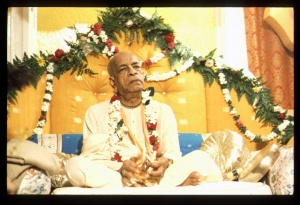SB 10.37.1-2: Difference between revisions
m (1 revision(s)) |
(Vanibot #0018 edit: make synonym terms in Sanskrit italic in SB - Vanisource) |
||
| Line 1: | Line 1: | ||
{{info | {{info | ||
|speaker= | |speaker=Nārada Muni | ||
|listener=Lord | |listener=Lord Kṛṣṇa the Supreme Personality of Godhead | ||
}} | }} | ||
[[Category:Srimad-Bhagavatam - Canto 10 Chapter 37|s01-02]] | |||
[[Category:Bhagavatam Verses Spoken by Narada Muni - Vanisource|103701]] | |||
<div style="float:left">'''[[Srimad-Bhagavatam]] - [[SB 10|Tenth Canto]] - [[SB 10.37: The Killing of the Demons Kesi and Vyoma|Chapter 37: The Killing of the Demons Keśi and Vyoma]]'''</div> | |||
<div style="float:right">[[File:Go-previous.png|link=SB 10.37 Summary]] '''[[SB 10.37 Summary]] - [[SB 10.37.3]]''' [[File:Go-next.png|link=SB 10.37.3]]</div> | |||
{{RandomImage}} | |||
{{SBnotice}} | |||
==== TEXTS 1-2 ==== | ==== TEXTS 1-2 ==== | ||
<div | <div class="verse"> | ||
śrī-śuka uvāca | :śrī-śuka uvāca | ||
keśī tu kaṁsa-prahitaḥ khurair mahīṁ | :keśī tu kaṁsa-prahitaḥ khurair mahīṁ | ||
mahā-hayo nirjarayan mano-javaḥ | :mahā-hayo nirjarayan mano-javaḥ | ||
saṭāvadhūtābhra-vimāna-saṅkulaṁ | :saṭāvadhūtābhra-vimāna-saṅkulaṁ | ||
kurvan nabho heṣita-bhīṣitākhilaḥ | :kurvan nabho heṣita-bhīṣitākhilaḥ | ||
taṁ trāsayantaṁ bhagavān sva-gokulaṁ | |||
tad-dheṣitair vāla-vighūrṇitāmbudam | :taṁ trāsayantaṁ bhagavān sva-gokulaṁ | ||
ātmānam ājau mṛgayantam agra-ṇīr | :tad-dheṣitair vāla-vighūrṇitāmbudam | ||
upāhvayat sa vyanadan mṛgendra-vat | :ātmānam ājau mṛgayantam agra-ṇīr | ||
:upāhvayat sa vyanadan mṛgendra-vat | |||
</div> | </div> | ||
| Line 22: | Line 28: | ||
==== SYNONYMS ==== | ==== SYNONYMS ==== | ||
<div | <div class="synonyms"> | ||
śrī-śukaḥ | ''śrī-śukaḥ uvāca''—Śrī Śukadeva Gosvāmī said; ''keśī''—the demon named Keśī; ''tu''—and then; ''kaṁsa-prahitaḥ''—sent by Kaṁsa; ''khuraiḥ''—with his hooves; ''mahīm''—the earth; ''mahā-hayaḥ''—a huge horse; ''nirjarayan''—ripping apart; ''manaḥ''—like that of the mind; ''javaḥ''—whose speed; ''avadhūta''—scattered; ''abhra''—with the clouds; ''vimāna''—and the airplanes (of the demigods); ''saṅkulam''—crowded; ''kurvan''—making; ''nabhaḥ''—the sky; ''heṣita''—by his neighing; ''bhīṣita''—frightened; ''akhilaḥ''—everyone; ''tam''—him; ''trāsayantam''—terrifying; ''bhagavān''—the Supreme Lord; ''sva-gokulam''—His cowherd village; ''tat-heṣitaiḥ''—by that neighing; ''vāla''—by the hairs of his tail; ''vighūrṇita''—shaken; ''ambudam''—the clouds; ''ātmānam''—Himself; ''ājau''—for a fight; ''mṛgayantam''—searching after; ''agra-nīḥ''—coming forward; ''upāhvayat''—called out; ''saḥ''—he, Keśī; ''vyanadan''—roared; ''mṛgendra-vat''—like a lion. | ||
</div> | </div> | ||
{{SBcollapse}} | |||
==== TRANSLATION ==== | ==== TRANSLATION ==== | ||
<div | <div class="translation"> | ||
Śukadeva Gosvāmī said: The demon Keśī, sent by Kaṁsa, appeared in Vraja as a great horse. Running with the speed of the mind, he tore up the earth with his hooves. The hairs of his mane scattered the clouds and the demigods' airplanes throughout the sky, and he terrified everyone present with his loud neighing. | Śukadeva Gosvāmī said: The demon Keśī, sent by Kaṁsa, appeared in Vraja as a great horse. Running with the speed of the mind, he tore up the earth with his hooves. The hairs of his mane scattered the clouds and the demigods' airplanes throughout the sky, and he terrified everyone present with his loud neighing. | ||
When the Supreme Personality of Godhead saw how the demon was frightening His village of Gokula by neighing terribly and shaking the clouds with his tail, the Lord came forward to meet him. Keśī was searching for Kṛṣṇa to fight, so when the Lord stood before him and challenged him to approach, the horse responded by roaring like a lion. | When the Supreme Personality of Godhead saw how the demon was frightening His village of Gokula by neighing terribly and shaking the clouds with his tail, the Lord came forward to meet him. Keśī was searching for Kṛṣṇa to fight, so when the Lord stood before him and challenged him to approach, the horse responded by roaring like a lion. | ||
</div> | </div> | ||
__NOTOC__ | </div> | ||
</div> | |||
<div style="float:right">[[File:Go-previous.png|link=SB 10.37 Summary]] '''[[SB 10.37 Summary]] - [[SB 10.37.3]]''' [[File:Go-next.png|link=SB 10.37.3]]</div> | |||
__NOTOC__ | |||
__NOEDITSECTION__ | |||
Revision as of 14:34, 1 December 2017

A.C. Bhaktivedanta Swami Prabhupada
Please note: The synonyms, translation and purport of this verse were composed by disciples of Śrīla Prabhupāda
TEXTS 1-2
- śrī-śuka uvāca
- keśī tu kaṁsa-prahitaḥ khurair mahīṁ
- mahā-hayo nirjarayan mano-javaḥ
- saṭāvadhūtābhra-vimāna-saṅkulaṁ
- kurvan nabho heṣita-bhīṣitākhilaḥ
- taṁ trāsayantaṁ bhagavān sva-gokulaṁ
- tad-dheṣitair vāla-vighūrṇitāmbudam
- ātmānam ājau mṛgayantam agra-ṇīr
- upāhvayat sa vyanadan mṛgendra-vat
SYNONYMS
śrī-śukaḥ uvāca—Śrī Śukadeva Gosvāmī said; keśī—the demon named Keśī; tu—and then; kaṁsa-prahitaḥ—sent by Kaṁsa; khuraiḥ—with his hooves; mahīm—the earth; mahā-hayaḥ—a huge horse; nirjarayan—ripping apart; manaḥ—like that of the mind; javaḥ—whose speed; avadhūta—scattered; abhra—with the clouds; vimāna—and the airplanes (of the demigods); saṅkulam—crowded; kurvan—making; nabhaḥ—the sky; heṣita—by his neighing; bhīṣita—frightened; akhilaḥ—everyone; tam—him; trāsayantam—terrifying; bhagavān—the Supreme Lord; sva-gokulam—His cowherd village; tat-heṣitaiḥ—by that neighing; vāla—by the hairs of his tail; vighūrṇita—shaken; ambudam—the clouds; ātmānam—Himself; ājau—for a fight; mṛgayantam—searching after; agra-nīḥ—coming forward; upāhvayat—called out; saḥ—he, Keśī; vyanadan—roared; mṛgendra-vat—like a lion.
Translation and purport composed by disciples of Śrīla Prabhupāda
TRANSLATION
Śukadeva Gosvāmī said: The demon Keśī, sent by Kaṁsa, appeared in Vraja as a great horse. Running with the speed of the mind, he tore up the earth with his hooves. The hairs of his mane scattered the clouds and the demigods' airplanes throughout the sky, and he terrified everyone present with his loud neighing.
When the Supreme Personality of Godhead saw how the demon was frightening His village of Gokula by neighing terribly and shaking the clouds with his tail, the Lord came forward to meet him. Keśī was searching for Kṛṣṇa to fight, so when the Lord stood before him and challenged him to approach, the horse responded by roaring like a lion.